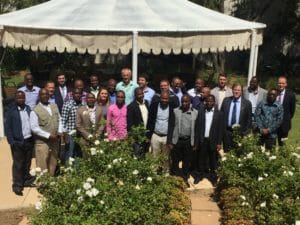On 23 March 2017 in Johannesburg, representatives from Southern African countries met to agree on the development of a regional energy efficiency roadmap. With support from the United for Efficiency Partnership, the countries decided to take the first step in transforming their markets to high-efficiency lighting, appliances and products such as air conditioners. This will unlock significant benefits, including savings for consumers in the order of $2 billion a year.

Experts from Southern African countries’ utilities, ministries, manufacturers and industry agree to improve energy efficiency policies.
Southern African countries face rising electricity demands due to economic development and the increased use of lighting, appliances and equipment. As the region generates 75 per cent of its electricity from fossil fuels, this growing demand also increases air pollution.
By switching to energy-efficient products, Southern Africa countries could reduce their electricity consumption down to a level that could serve to electrify 16 million homes in the region. In addition, investment from over 30 unnecessary power plants could be redirected.
In 2015, representatives of several Southern African countries, including from government, power utilities and manufacturers, agreed to tackle this challenge together. In Johannesburg in March, participants reaffirmed their commitment and provided guidance on a regional roadmap.
Within this roadmap, the countries will reduce regulatory barriers, develop consumer incentive systems and generate consumer confidence through improved market surveillance and product verification. The United Nations, governments, utilities, manufacturers and other stakeholders support the initiative.
At the launch, participant Lebohang Mohasoa, Large Customers Manager of Lesotho Electricity Company, said “the Electricity generation deficit in Lesotho is a serious challenge to providing access to all our citizens. We depend on imports to bridge the gap. In Lesotho, institutional support for energy efficiency is needed. Our current national energy policy does not define a role for energy efficiency and Demand Side Management to details.”
A policy implemented some years ago in Lesotho gives hope on energy efficiency improvements.
The country successfully experimented with on-bill financing, a method of financing energy efficiency improvements that uses the electricity bill as the repayment vehicle. This was through a Power-Factor Correction initiative for Large Power Users. Many citizens repaid their obligations in advance of the three-year payback timeframe.
The United for Efficiency Partnership will now support Lesotho and its neighbouring countries to take such successful policy examples to the next level. It will coordinate the development of the regional roadmap, ensuring that it emphasises an integrated policy approach that is predicated on mandatory standards, and includes product labels, awareness campaigns, testing of product performance, financing, and other supporting policies.
“We look forward to taking United for Efficiency’s integrated policy approach – which has been a success in Southeast Asian and West African countries – and applying it in Southern African countries,“ explained Brian Holuj, Programme Officer of United for Efficiency, at the event.
Mr. Holuj outlined how the project partners will work together to complete an in-depth market assessment in each country and across the region for products over the next six months. This assessment will help the countries to develop the regional energy efficiency roadmap, identifying standards and supporting activities that countries can pursue together.
Experts from utilities, ministries, manufacturers and industry participated in the event. They came to Johannesburg from Botswana, Lesotho, Malawi, Mozambique, Namibia, South Africa, Swaziland, Tanzania, Zambia, and Zimbabwe.
Mr. Mohasoa underscored the enthusiasm of the participants, noting, “We look forward to the region working together with the international partners of United for Efficiency!”
The workshop was hosted by Eskom, a South African electricity public utility, and championed by the Southern African Power Pool, a co-operation of the national electricity companies in the region.
Read more about this United Nations Climate Technology Centre and Network initiative
Explore the United for Efficiency Country Assessments for Southern African countries